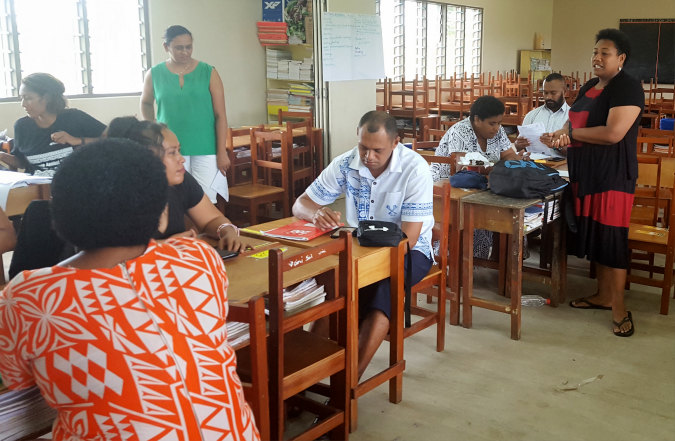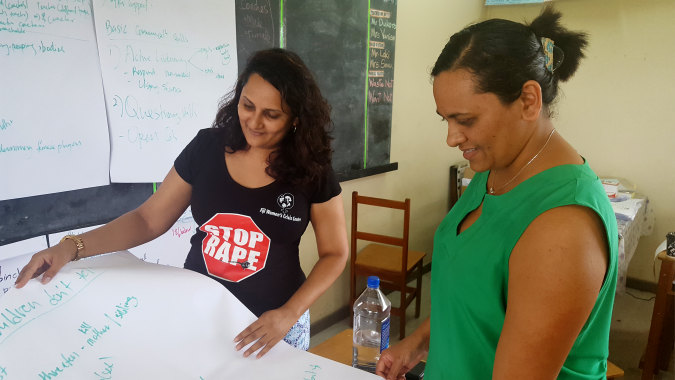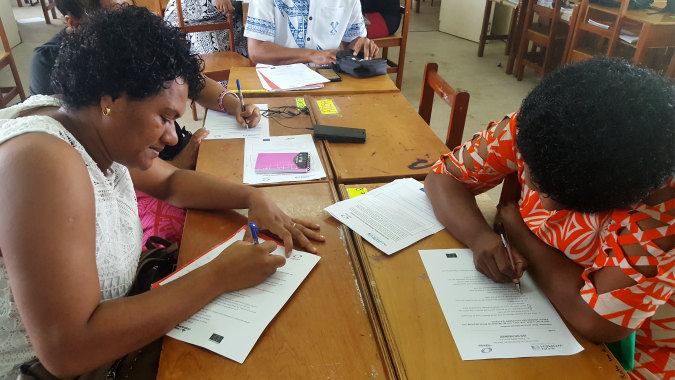Western and Central Division Coaches Merge Rugby and Life Skills for Youth Players
Date:

JOINT RELEASE: OCEANIA RUGBY, UN WOMEN FIJI MULTI COUNTRY OFFICE
Girl and boy rugby players aged 10-14 years in the western and central divisions of Fiji, will benefit from new coaching approaches as a result of ongoing Get Into Rugby PLUS training that includes both rugby skills and life skills to deal with everyday life.
“It’s an honour and a privilege to be a Get into Rugby PLUS coach,” says Kitiana Kaitu, Teacher at St Joseph the Worker Primary School and Get into Rugby PLUS Coach.

“I’m not just a rugby coach but also an advocate for those who cannot voice their opinion. I love that I’m working together with others for the future of the nation,” Ms Kaitu said.
Get Into Rugby PLUS is co-funded by Oceania Rugby, through Rugby Australia and the Australian Government’s Pacific Sports Partnership (PSP), and also by UN Women Fiji MCO, through the EUR19.5m regional Pacific Partnership to End Violence Against Women and Girls (Pacific Partnership) funded by the European Union and Australian Government with support from UN Women.
The curriculum component of GIR PLUS is adapted to the Pacific from the ChildFund Pass It Back sport for development programme and is being implemented with support from the Fiji Rugby Union (FRU).
Through the new Get Into Rugby PLUS initiative, highly skilled coaches are learning new ways to support equal and safe rugby participation for girls and boys, whilst building their skills needed to effectively deal with the challenges of life such as peer pressure, resolving conflict, relationships and where to get support.

The most recent training was held early April to upskill coaches in strengthening, conditioning and safeguarding. Safeguarding is a commitment to guaranteeing the safety and wellbeing of all young people and vulnerable persons within an organisation.
In rugby this means coaches take action to ensure all young people are safe from harm when involved in rugby clubs, programmes and activities. Integrating safeguarding principles into training and coaching practices helps to ensure all young people participating in sport have a positive experience.
“I’d done some Get into Rugby PLUS training before, but the strength and conditioning training really enlightened me to why we do the things we do in a training session. The Safeguarding reinforced the importance on focussing on child welfare – physical and emotional, when we coach,” Ms Kaitu said.

The Get Into Rugby PLUS programme includes male and female coaches who embed life skill sessions into rugby practice for boys and girls who are encouraged to uphold the values of as players on the field and in their personal life, as part of a long-term approach to shifting attitudes and beliefs around gender, power, violence and respectful relationships.
The conditioning, strengthening and safeguarding training was held early this month for the Central Division at Nausori District School and the Western Division at the Tanoa Skylodge in Nadi, ending on 16 April.
#OceaniaRugby #PacPartnership #EqualPlayeringField
Oceania Rugby:
Sarah Walker | E: sarah.walker@oceaniarugby.com | P: +61 418 678 548
UN Women Fiji Multi Country Office: EVAWG Communications and Media Specialist
Jacqui Berrell | E: jacqui.berrell@unwomen.org | Ph: +679 330 1178 ext 145
BACKGROUND
Pacific Partnership: The Pacific Partnership to End Violence Against Women and Girls (Pacific Partnership) brings together governments, civil society organisations, communities and other partners to promote gender equality, prevent violence against women and girls (VAWG), and increase access to quality response services for survivors. The EUR 19.5million programme is funded primarily by the European Union (EUR 12.7m) with targeted support from the Australian Government (EUR 6.2m) and UN Women (EUR 0.6m).
Get Into Rugby PLUS: A new Get Into Rugby PLUS (GIR PLUS) programme will provide activities for young people to support equal and safe rugby participation for girls and boys in the Pacific region. Building on the Get Into Rugby (GIR) initiative developed by World Rugby, coaches will be trained to integrate life-skill activities for a safer and more inclusive rugby environment. This approach aims to challenge gender stereotypes and contributes to reducing violence against women and girls. The curriculum content for GIR PLUS has been developed specifically for the Pacific and adapted from the ChildFund Pass It Back sport for development programme.
ChildFund Australia: ChildFund Pass It Back is an innovative Sport for Development program led by ChildFund in partnership with World Rugby and Asia Rugby that delivers an integrated life skills and rugby curriculum for children and young people in disadvantaged communities across Asia as part of the Impact Beyond Rugby World Cup 2019 program.
Oceania Rugby: Oceania Rugby is one of six regional associations of World Rugby, responsible for representing the interests of its Members, which includes 15 Member Unions and 1 Associate Member Union. Oceania Rugby works closely with Member Unions on the development and reach of Rugby in the region to promote the growth of Rugby throughout Oceania. Central to this is a series of tournaments and development programs run and coordinated by Oceania Rugby.
UN Women Multi-Country Office (MCO) in Fiji: A global champion for women and girls, UN Women was established to accelerate progress on meeting their needs worldwide. The UN Women Multi-Country Office (MCO) based in Fiji, covers 14 Pacific Island Countries and Territories (PICTs): Cook Islands, Federated States of Micronesia, Fiji, Kiribati, Nauru, Niue, Palau, Republic of Marshall Islands, Samoa, Solomon Islands, Tokelau, Tonga, Tuvalu and Vanuatu. The Fiji MCO works to progress gender equality and women’s empowerment in the Pacific through four key programmes: Women’s Economic Empowerment; Ending Violence Against Women and Girls; Women’s Political Empowerment, Leadership and Human Rights; and Gender and Protection in Humanitarian Action.